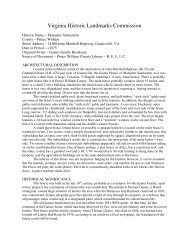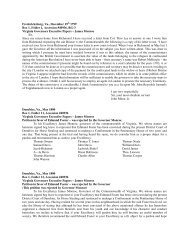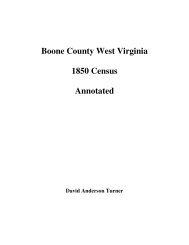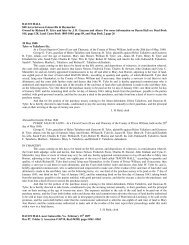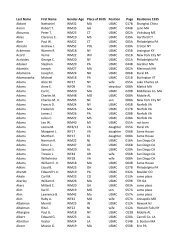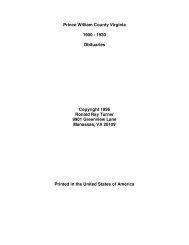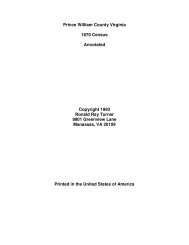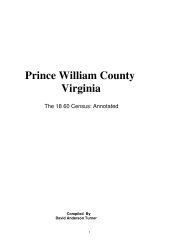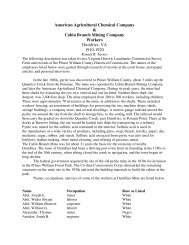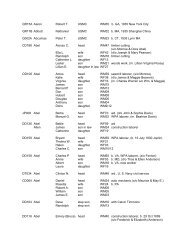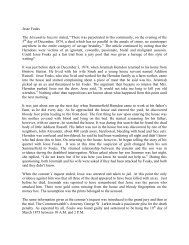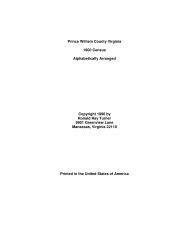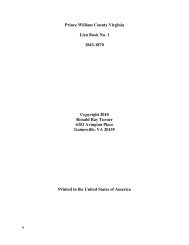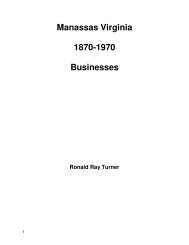Hiram Eastman â Civil War Deserter - Prince William County Virginia ...
Hiram Eastman â Civil War Deserter - Prince William County Virginia ...
Hiram Eastman â Civil War Deserter - Prince William County Virginia ...
- No tags were found...
Create successful ePaper yourself
Turn your PDF publications into a flip-book with our unique Google optimized e-Paper software.
<strong>Hiram</strong> <strong>Eastman</strong> – <strong>Civil</strong> <strong>War</strong> <strong>Deserter</strong>On April 17, 1861, the <strong>Prince</strong> <strong>William</strong> <strong>County</strong> Cavalry was ordered into service by the governor of <strong>Virginia</strong>. As thishad been rumored for weeks, it was not a surprise to anyone. All members were ordered to be at Brentsville Aprilthe 23 or be represented by a substitute. The following enlistees included many of the county’s most well knowncitizens:Captain W. W. Thornton Lucien Alexander Davis Samuel S. F. Davis<strong>Hiram</strong> F. <strong>Eastman</strong> Thomas Price Ellicott Maurice EvansMatthew Finegan John Gaines J. M. GrahamGeorge W. Herndon John H. Herndon Henry HollandMeredith Horton Lucien L. Omear David T. NormanBenjamin P. Mitchell James W. Peters James B. PridmoreThomas W. Marders <strong>William</strong> H. Selecman Benjamin Dyer MerchantL. A. Marsteller John R. Jewell Charles E. KeysRobert H. King Colin K. Lambert James E. LarkinAbsalom T. Lynn George H. Lynn John H. LynnLeroy W. Lynn Milton Lynn Richard B. L. MacraeJames M. Shirley John R. Shirley Thomas S. ShirleyThomas O. Thornton Charles H. Weedon John Vivian TowlesRobert C. Towles A. M. Walls <strong>William</strong> T. WashingtonPeter Thomas WeedonCharles Donahoe<strong>Hiram</strong> F. <strong>Eastman</strong> was a member of Company A of the 4 th <strong>Virginia</strong> Cavalry in the Confederate Army. Similar tomany other privates, not much has been written about him in the official records of the <strong>Civil</strong> <strong>War</strong>. In fact, there isonly one line about him in the entire regimental series, which states “<strong>Hiram</strong> F. <strong>Eastman</strong>, Company A, enlisted4/23/61, deserter.”Just off route 234 in the Dumfries area sits a beautiful piece of land, known today as the Four Seasons AdultCommunity. Most old timers will tell you the community was built on the old Bailey Farm. This is true, but beforethe Bailey family farmed this land, it had been settled by two New York families named <strong>Eastman</strong> and Calender.In the early 1850s along with a great influx of other northerners, these two families found their way to <strong>Prince</strong><strong>William</strong> <strong>County</strong>, built houses, and started to ingrain themselves within the community. In just a few short years,their lives began to change in a way for which they had not bargained. The mood in <strong>Prince</strong> <strong>William</strong> was changing,and most late coming northerners were at a loss as to what they should do. Most, but not <strong>Hiram</strong>, thought it wise tojoin a <strong>Virginia</strong> Militia even though their hearts seemed to mirror the views of the future enemy. A relative, onlyreferred to as Russell, had joined the <strong>Prince</strong> <strong>William</strong> Cavalry over a year before the war had started and, in April1861, had been ordered to join the secession army. <strong>Hiram</strong> decided that, for the good of the family, he would join the4 th <strong>Virginia</strong> as a substitute to replace Russell. He left the farm and made his way to Brentsville where he, along withabout 50 others, enlisted April 23, 1861, in Captain <strong>William</strong> Willis Thornton’s Company A of the 4 th <strong>Virginia</strong>Cavalry.Russell was later informed that even though he had used a substitute, his militia unit was being called into activeservice, and he would have to leave within a week. He immediately decided to leave <strong>Virginia</strong> rather than join theConfederate forces. He left at night with the hope of reaching Washington City a place of safety. By putting hisclothes on a raft and swimming Occoquan Bay, pushing the raft before him, he escaped from <strong>Prince</strong> <strong>William</strong><strong>County</strong>. On hearing of Russell’s escape, <strong>Hiram</strong> decided that he, too, would desert when a chance presented itself.Capt. Thornton was ordered to Fairfax Court House to prepare for an attack. On the night of May 31, 1861, the 4 thwas ordered into action to confront the approaching 2 nd US Cavalry. This appears to be the only action <strong>Hiram</strong><strong>Eastman</strong> saw in his short tenure in the Confederate Army. After this one skirmish, <strong>Hiram</strong>, along with the rest ofCompany A, was sent to the lower part of <strong>Prince</strong> <strong>William</strong> at Camp Scott near Occoquan to patrol the Potomac fromOccoquan to Dumfries. The following is from a letter written by <strong>Hiram</strong> to his sister, telling of his escape.
“Once more I have the liberty and opportunity to write you. We have seen rather serious times in Old <strong>Virginia</strong>,during the last three months, though, as yet, our family have not suffered particularly. I was sent down to the river towithdraw the guard. Leaving my horse, I walked about three miles to where they were stationed, and when they hadgone, went out into a field where some Negroes were at work, and ordered them to follow me. We went into a fishhouse and took out a boat, which, when put in the water, leaked faster than I could bail with a large pail. We thenwent in search of old clothes, and finally succeeded in caulking it pretty well. One Negro got in with me and westarted on our voyage with nothing except two pieces of board we found on the shore. We succeeded in this wayvery well for a mile or so, when there came up a gale and we were obliged to go ashore again. We laid down for anhour, and then started again. This time we got along better, and finally landed five miles above, this side ofOccoquan Bay, about one o’clock A.M. We spent the rest of the night in a field, under a shock of rye, out of therain. In the morning again took up the line of March, and walking fifteen miles to Accotink, where I arrived abouteleven o’clock, without having had anything to eat since six o’clock of the morning before.”“You can imagine my condition after going without food so long, and walking and working as I had. We are alldoing well enough at present, however, so you need feel no more anxiety on our account. We left the cropsharvested, with no one to draw them in or thresh them. I had no opportunity to go home after clothes or anything,and am in rather destitute circumstances; but that I don’t mind any, as I am now getting wages enough for mywants.”Not much is known of what happened to <strong>Hiram</strong> <strong>Eastman</strong> after his desertion and escape from <strong>Virginia</strong> other than hejoined the Union Army and served in the 11 th Regiment, New York Cavalry. There is no record of <strong>Hiram</strong>’s returningto <strong>Prince</strong> <strong>William</strong> after the war. In fact, only the family cemetery and a beautiful 200 year old tree remain asacknowledgements of the old <strong>Eastman</strong> Place.Ron Turner



